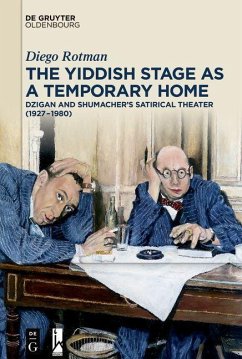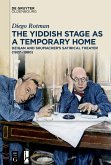Dieser Download kann aus rechtlichen Gründen nur mit Rechnungsadresse in A, B, BG, CY, CZ, D, DK, EW, E, FIN, F, GR, HR, H, IRL, I, LT, L, LR, M, NL, PL, P, R, S, SLO, SK ausgeliefert werden.
"A comprehensive study, brimming with facts and details, it lays out before us the duo's life stories and artistic endeavors [...] In this fascinating and important study, Rotman intentionally avoids his own discourse of sadness. Via meticulous attention to detail, an impressive collection of testimonies and quotations, and an analysis (sometimes arcane) of theatrical means, he manages to avoid a sentimental requiem to a lost experience, instead depicting with great practicality rich artistic lives, a unique cultural milieu, the rare loyalty of these artists to their audience, and their stubborn persistence in a losing battle." Michal Zamir, Haaretz
"This book constitutes a milestone in the historiographical study of Israeli theater [...] Here the reader encounters many different voices within a textual fabric that moves between Hebrew and Yiddish. Alongside academic, historical, textual, and performative interpretations, Rotman reproduces scripts and provides translations of skits, thus representing, in content and in structure, a mixture of the cultural and the academic [...]. [The book reveals] the foreignness and strangeness of these actors, as well as the possibility that they could bridge between worlds by spinning together action and theory, the artistic and the academic." Ruthie Abeliovich, Gal-Ed Journal
"[...] a masterfully crafted, definitive account of these major figures which will appeal to readers interested in twentieth-century Yiddish comedy and the politics of culture in Israel." Adi Mahalel, East European Jewish Affairs
"Rotman deals with erudition with the three periods in the life of his "heroes". The reader follows them through Lodz to Warsaw, and later to Bialystok, which fell into Soviet hands after the outbreak of World War II. [...] Dzigan and Shumacher remained faithful to Yiddish their entire life. That means, writes Rotman, that after the Holocaust, they didn't belong to any specific place anymore, and they carried their diaspora in the State of Israel." (Übersetzung) Mikhail Krutikov in: Forward, https://forward.com/yiddish/467887/dzigan-and-schumacher-actors-on-the-stage-of-jewish-exile/ (20.04.2021)
"The Stage as a Temporary Home weds idiosyncratic aspects of Jewish tradition and culture with the overarching universal themes of courage, freedom of speech, and, ultimately, space and being. It is an important book for theater scholars, for those wishing to understand the place of critical artists in social and political life, and for readers interested in the Israeli culture wars that pitted Hebrew against Yiddish and resulted in the marginalization of the 'language of the Exile and Diaspora'. In short, this book is eye-opening, funny, dead serious, and an important contribution to our understanding of Jewish life in Eastern Europe before World War II and in Israel thereafter." Shapiro Prize for the Best Book on Israel Studies, 2019, Israel Studies Review (Raphael Cohen Almagor, Tamar Hermann, Hanna Herzog, Sam Lehman-Wilzig, and Ruvi Ziegler)
"[...] Rotman, who is the Head of the Department of Theater Studies at the Hebrew University, has one foot squarely in the world of theater and performance studies, and his knowledge of the field adds marvelously to his analysis of Dzigan and Shumacher's comedic sketches." Debra Caplan in: In Geveb, https://ingeveb.org/articles/review-of-diego-rotmans-the-yiddish-stage-as-a-temporary-home (02.10.2023)









